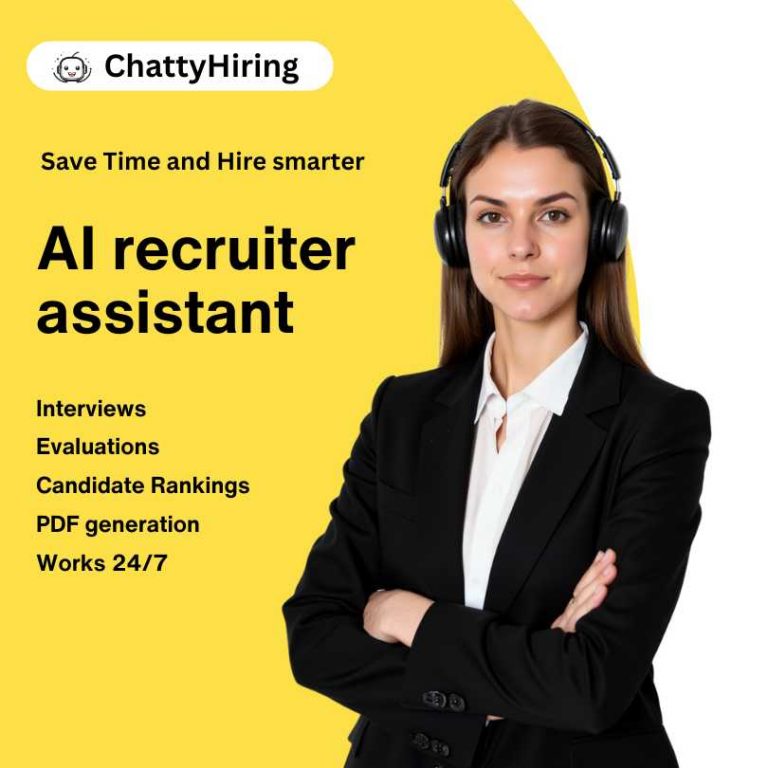Artificial intelligence is reshaping how companies find and hire talent in ways that seemed impossible just a few years ago. AI is changing recruiting from sourcing to screening to retention, transforming every stage of the hiring process through automation and data-driven insights. What once required weeks of manual work can now happen in hours, with AI systems screening thousands of candidates, conducting initial interviews, and even predicting which applicants will succeed in specific roles.

The shift isn’t just about speed and efficiency. Three-quarters of HR professionals believe AI advancements will increase the value of human judgement, suggesting a future where technology handles routine tasks whilst humans focus on strategic decisions and relationship building. Companies are discovering that AI doesn’t simply replace human recruiters but changes how they work entirely.
This transformation affects everyone involved in hiring, from recruitment teams adapting to new tools to candidates experiencing AI-powered application processes. Understanding these changes is crucial for businesses wanting to attract top talent and for job seekers navigating an increasingly digital recruitment landscape.
Key Takeaways
- AI automates routine recruitment tasks like screening and initial interviews whilst enhancing human decision-making capabilities
- Technology reduces hiring bias and enables skills-based approaches that focus on candidate potential rather than traditional qualifications
- Human recruiters are evolving into strategic roles that emphasise relationship building and complex decision-making alongside AI tools
How AI Is Transforming Hiring Trends
Companies are shifting from testing AI tools to making them core parts of their hiring strategies. Market growth and new technology are driving major changes in how organisations find and hire talent.
From Experimentation to Strategic Adoption
Most companies have moved past simply testing AI tools in their hiring processes. They now use AI to automate repetitive tasks like resume screening and interview scheduling, freeing up recruiters to focus on building relationships with candidates.
Strategic adoption means AI in hiring has become part of long-term talent acquisition plans. Companies integrate AI systems across multiple stages rather than using them for single tasks.
The shift happened because early AI tools proved their value. AI can assess candidate success probability by analysing past hiring data, helping companies make better decisions based on real evidence.
Modern AI adoption includes:
- Full recruitment pipeline integration
- Predictive analytics for candidate success
- Automated candidate communication
- Real-time performance tracking
Key Drivers of Change in Talent Acquisition
Three main factors drive AI adoption in recruitment. First, the need for speed pushes companies to use AI chatbots handling FAQs and delivering real-time responses to candidates.
Second, talent shortages force recruiters to expand their search. AI allows the net to be cast much wider and helps recruiters screen far more candidates than traditional methods allow.
Competition for top talent creates the third driver. Companies need faster, more accurate ways to identify good candidates before competitors do.
Data quality improvements also fuel change. Better candidate databases and performance metrics help AI enhance data-driven hiring decisions by analysing CVs and learning from past hires.
Adoption Rates and Market Growth
AI in recruitment shows rapid growth across different company sizes and industries. Large enterprises lead adoption rates, with over 70% using some form of artificial intelligence in their hiring processes.
Medium-sized companies follow close behind. They adopt AI tools to compete with larger organisations for the same talent pools.
AI is improving nearly every stage of the talent acquisition life cycle, from predicting hiring needs to onboarding new employees.
Market growth indicators include:
- Increased vendor offerings for AI recruitment tools
- Higher investment in recruitment technology budgets
- Expanded use cases beyond basic resume screening
- Integration with existing HR systems
Small businesses now access AI through affordable cloud-based platforms. This democratisation means companies of all sizes can use advanced recruitment technology that was once available only to large corporations.
Automation Across the Recruitment Lifecycle
AI-powered hiring tools now handle tasks from initial candidate sourcing through final interview scheduling. These systems reduce manual work for recruiters whilst improving speed and accuracy throughout the entire hiring process.
Automated Candidate Sourcing
Modern AI systems scan multiple platforms to identify potential candidates automatically. They search job boards, social media profiles, and professional networks using specific criteria set by recruiters.
These tools analyse candidate profiles against job requirements in seconds. The technology identifies skills, experience levels, and qualifications without human intervention.
Key sourcing capabilities include:
- Database searches across LinkedIn, Indeed, and niche job sites
- Boolean search automation with complex criteria
- Passive candidate identification through social media analysis
- Skills matching using natural language processing
AI recruitment tools can process thousands of profiles daily. This expanded reach helps companies find candidates they might have missed through traditional methods.
The systems also track sourcing effectiveness. They measure which platforms yield the best candidates for specific roles, helping recruiters focus their efforts.
AI-Based Screening and Evaluation
Automated screening systems review CVs and applications within minutes of submission. They use machine learning to identify the most qualified candidates based on predetermined criteria.
Screening processes typically evaluate:
- Work experience relevance
- Educational background matching
- Skills alignment with job requirements
- Career progression patterns
AI streamlines the recruitment process by ranking candidates automatically. The highest-scoring applicants move forward whilst others receive immediate feedback.
Some platforms use game-based assessments to evaluate cognitive abilities. These tools measure problem-solving skills, personality traits, and cultural fit without traditional testing methods.
The technology also reduces unconscious bias in initial screening. It focuses on qualifications and experience rather than names, photos, or other potentially biasing factors.
Results appear in dashboard formats showing candidate scores and rankings. Recruiters can then review top performers and make informed decisions about next steps.
Interview Scheduling and Coordination
AI-powered scheduling tools eliminate back-and-forth emails between candidates and hiring teams. They integrate with calendar systems to find optimal meeting times automatically.
Candidates receive links to self-service booking platforms. They can view available slots and select times that work for their schedules without recruiter intervention.
Scheduling features include:
- Multi-participant calendar coordination
- Time zone adjustments for remote interviews
- Automatic reminder emails and notifications
- Rescheduling options with instant updates
The systems also prepare interview materials automatically. They compile candidate information, generate question suggestions, and distribute briefing documents to interviewers.
Some platforms offer AI-powered video interviewing capabilities. These tools conduct initial screening interviews using pre-recorded questions and analyse responses for further evaluation.
The candidate experience improves significantly with these automated systems. Applicants appreciate the convenience and speed of self-service scheduling options.
Interview coordination becomes seamless across multiple rounds. The technology tracks progress and ensures all stakeholders receive timely updates throughout the process.
Enhancing Candidate Engagement and Employer Brand

AI transforms how companies connect with job seekers through personalised messaging, streamlined experiences, and strategic brand positioning. These technological advances reshape recruitment by creating more meaningful interactions and stronger employer reputations.
Personalised Communication at Scale
AI enables recruiters to craft tailored messages for thousands of candidates simultaneously. Machine learning algorithms analyse candidate profiles, career histories, and preferences to generate relevant outreach content.
AI-driven tools provide real-time feedback and automated personalised outreach that resonates with individual job seekers. This approach increases response rates compared to generic recruitment emails.
Generative AI creates customised job descriptions that highlight specific benefits and opportunities matching each candidate’s background. The technology adjusts language tone and content focus based on the recipient’s experience level and industry preferences.
Key personalisation features include:
- Dynamic job recommendations based on skills and interests
- Automated follow-up messages with relevant timing
- Customised interview scheduling that fits candidate availability
- Targeted content delivery across multiple communication channels
Companies report higher engagement rates when using AI-powered personalisation compared to traditional mass communication methods.
Improving Candidate Experience
AI enhances interview experiences with virtual assistants that guide candidates through application processes. These digital tools answer questions instantly and provide status updates without human intervention.
Automated assessment platforms create smoother evaluation experiences. Candidates receive immediate feedback on skills tests and personality assessments, reducing waiting periods that often frustrate job seekers.
Data-driven approaches offer AI-powered job recommendations and real-time application updates throughout the hiring journey. This transparency builds trust and keeps candidates engaged.
Experience improvements include:
- 24/7 chatbot support for application queries
- Mobile-optimised application processes
- Instant confirmation and progress tracking
- Simplified scheduling with calendar integration
These innovations create seamless candidate experiences that boost engagement and reduce dropout rates during lengthy recruitment cycles.
Brand Perception in the Age of AI
75% of job seekers consider an employer’s brand before applying, making brand perception crucial for talent acquisition success. AI-driven insights help companies understand what candidates value most.
LinkedIn Talent Insights allows companies to analyse competitor strategies and candidate preferences for targeted brand positioning. This data guides messaging and recruitment marketing decisions.
Generative AI creates consistent brand messaging across job postings, career pages, and social media content. The technology ensures all candidate touchpoints reflect company values and culture accurately.
Brand enhancement strategies:
- Social media content optimisation based on candidate interests
- Reputation monitoring and response automation
- Employee advocacy programme development
- Competitive brand analysis and positioning
Companies using AI for brand management report stronger candidate interest and improved application quality from aligned job seekers.
Reducing Bias and Supporting Fair Hiring

Artificial intelligence offers new ways to tackle longstanding bias problems in recruitment whilst maintaining human judgment where it matters most. Modern AI-powered HR tools focus on fairness through algorithmic screening and anonymised candidate evaluation.
Algorithmic Screening and Human Bias
Traditional hiring processes often reflect unconscious human bias through subjective decision-making. Recruiters may favour candidates from similar backgrounds or make assumptions based on names, universities, or previous employers.
AI recruitment systems can reduce these biases by focusing on skills and qualifications rather than demographic indicators. These systems analyse candidate responses, work samples, and assessment results using consistent criteria.
Key benefits of algorithmic screening:
- Eliminates subjective first impressions
- Applies uniform evaluation standards
- Reduces influence of irrelevant factors
- Increases focus on job-relevant skills
However, artificial intelligence isn’t automatically bias-free. AI tools can replicate past discrimination if trained on biased historical data.
Companies must regularly audit their AI systems. This involves testing algorithms with diverse candidate profiles and monitoring hiring outcomes across different demographic groups.
Anonymisation and Blind Recruitment
Blind recruitment removes identifying information during initial screening stages. Candidates’ names, photos, university names, and personal details are hidden from recruiters and hiring algorithms.
Structured interviewing combined with AI platforms creates more objective evaluation processes. This approach ensures all candidates answer identical questions and receive consistent assessment criteria.
Anonymisation techniques include:
- Removing names and contact details
- Hiding educational institution names
- Masking location information
- Concealing previous employer identities
This method allows human judgment to focus purely on candidate abilities. Recruiters evaluate responses, portfolio work, and technical skills without demographic influences affecting their decisions.
The quality of hire often improves when companies implement blind recruitment practices. Hiring managers discover talented candidates they might have previously overlooked due to unconscious bias.
Skills-Based and Future-Oriented Hiring Approaches
Companies are moving away from degree requirements and embracing skills-based hiring methods that focus on what candidates can actually do. Advanced screening tools now predict which applicants will succeed, whilst interview techniques are evolving to assess real abilities rather than just qualifications.
Skills-First Selection and Transferable Skills
Skills-based hiring prioritises capability over traditional credentials, fundamentally changing how recruiters evaluate candidates. This approach removes degree requirements from job postings and focuses on demonstrated abilities.
Transferable skills have become central to modern candidate screening. These include problem-solving, communication, and adaptability – abilities that work across different roles and industries.
AI tools analyse portfolios, work samples, and skill assessments to identify qualified candidates. This method often reveals top talent that traditional hiring would miss because they lack formal qualifications.
Key transferable skills employers seek:
- Critical thinking and analysis
- Digital literacy and tech adaptation
- Leadership and team collaboration
- Creative problem-solving
Companies using this approach report finding stronger performers who stay longer in their roles. The focus shifts from what school someone attended to what they can accomplish.
Predictive Analytics for Top Talent
AI systems now predict which candidates will become top performers before they start work. These tools analyse patterns in successful employees’ backgrounds, skills, and behaviours to identify similar traits in new applicants.
Machine learning algorithms process thousands of data points from CVs, assessments, and previous job performance. This creates detailed profiles of what makes someone likely to succeed in specific roles.
Predictive factors AI identifies:
- Skill progression patterns – How quickly candidates learn new abilities
- Problem-solving approaches – Methods used to tackle challenges
- Communication styles – How they interact with teams
- Adaptability markers – Response to change and feedback
The future of recruiting relies heavily on these data-driven insights to make better hiring decisions. Companies can now predict retention rates and performance levels with remarkable accuracy.
This technology helps recruiters focus their time on the most promising candidates rather than sorting through hundreds of applications manually.
The Shift in Interview Questions and Human Judgement
Interview questions are evolving to test practical skills rather than theoretical knowledge. Employers now ask candidates to solve real problems, demonstrate software proficiency, or walk through their decision-making process.
Human judgement remains crucial even as AI handles initial screening. Recruiters focus on cultural fit, communication skills, and leadership potential – areas where personal interaction provides insights that algorithms cannot capture.
Modern interview approaches include:
- Live coding or design challenges
- Case study problem-solving
- Role-playing customer interactions
- Portfolio presentations and explanations
AI handles data-heavy tasks whilst human recruiters concentrate on relationship-building and final decisions. This combination produces more accurate assessments of candidate potential.
Interviewers now spend more time understanding how candidates think and work rather than testing memorised information. The goal is predicting real-world performance, not academic achievement.
The Evolving Role of Human Recruiters
Human recruiters are transforming their roles rather than being replaced by artificial intelligence. They now focus on strategic partnerships whilst AI handles routine tasks, creating a balance between technological efficiency and human insight.
AI as an Assistant, Not a Replacement
Between 35% and 45% of companies have adopted AI in hiring, but human recruiters remain essential. AI handles screening CVs, scheduling interviews, and processing applications. This frees recruiters to focus on meaningful work.
Recruiters now spend more time building relationships with candidates and hiring managers. They conduct deeper interviews and assess cultural fit. AI cannot replicate empathy or understand complex human motivations.
Recruiters use AI to streamline administrative tasks and focus on high-value activities. These include candidate engagement and strategic hiring decisions. The technology enhances their abilities rather than replacing them.
Key AI-assisted tasks:
- Initial candidate screening
- Interview scheduling
- Reference checking
- Skills assessment scoring
Balancing Technology with Human Intuition
Successful recruiters combine AI insights with human judgement. They use data from AI tools to make informed decisions whilst trusting their instincts about candidates. This creates better hiring outcomes than using either approach alone.
Technology provides candidate analytics and market trends. However, recruiters interpret this data through their experience and understanding of company culture. They know which candidates will thrive beyond what algorithms suggest.
Modern recruiters have evolved from talent finders to strategic partners. They advise hiring managers on market conditions and candidate expectations. Their role requires both technical skills and emotional intelligence.
Recruiters also manage the candidate experience during AI-driven processes. They ensure personal connections remain strong even when technology handles initial interactions.
Preparing for the Future of Recruiting
The future of recruiting demands new skills from human recruiters. They must understand AI tools and interpret data-driven insights. Technical literacy becomes as important as traditional recruiting abilities.
Recruitment companies must adapt to remain competitive in changing markets. Recruiters need training in AI platforms and analytics tools. They also require skills in change management and strategic thinking.
Essential future skills include:
- AI tool proficiency
- Data analysis capabilities
- Strategic consultation
- Advanced relationship building
Recruiters who embrace technology whilst maintaining human connections will lead talent acquisition teams. They become advisers who guide both candidates and employers through complex hiring decisions. Their expertise grows more valuable as AI handles routine tasks.
-

A passionate advocate for the future of HR innovation. With expertise in leveraging AI to revolutionize recruitment processes, Carlos has a clear vision: empower HR teams while creating meaningful candidate experiences.
View all posts





